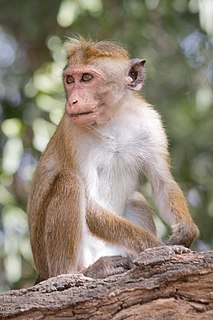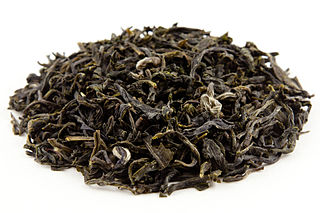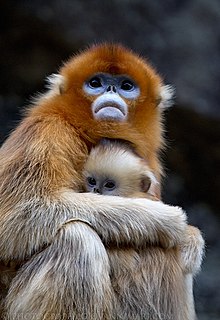
Oolong is a traditional semi-oxidized Chinese tea produced through a process including withering the plant under strong sun and oxidation before curling and twisting. Most oolong teas, especially those of fine quality, involve unique tea plant cultivars that are exclusively used for particular varieties. The degree of oxidation, which varies according to the chosen duration of time before firing, can range from 8–85%, depending on the variety and production style. Oolong is especially popular in south China and among Chinese expatriates in Southeast Asia, as is the Fujian preparation process known as the Gongfu tea ceremony.

Sun Wukong, also known as the Monkey King, is a figure who features in a body of legends that can be traced back to the Song dynasty. He appears as a main character in the 16th century Chinese classical novel Journey to the West (西游记) and is found in many later stories and adaptations. In the novel, he is a monkey born from a stone who acquires supernatural powers through Taoist practices. After rebelling against heaven and being imprisoned under a mountain by the Buddha, he later accompanies the monk Tang Sanzang on a journey to retrieve Buddhist sutras from "the West".

The Old World monkeys is the common English name for a family of primates known taxonomically as the Cercopithecidae. Twenty-four genera and 138 species are recognized, making it the largest primate family. Old World monkey genera include baboons and macaques '. Common names for other Old World monkeys include the talapoin, guenon, colobus, douc, vervet, gelada, mangabey, langur, mandrill, surili, patas, and proboscis monkey. Phylogenetically, they are more closely related to apes than to New World monkeys. They diverged from a common ancestor of New World monkeys around 55 million years ago, before South America and Africa separated about 50 million years ago.

Huangshan is a mountain range in southern Anhui province in eastern China. Vegetation on the range is thickest below 1,100 meters (3,600 ft), with trees growing up to the treeline at 1,800 meters (5,900 ft).

PG Tips is a brand of tea in the United Kingdom, manufactured by Unilever UK.

Snub-nosed monkeys are a group of Old World monkeys and make up the entirety of the genus Rhinopithecus. The genus is rare and needs much more research. Some taxonomists group snub-nosed monkeys together with the genus Pygathrix.

The history of tea is long and complex, spreading across multiple cultures over the span of thousands of years. Tea likely originated in the Yunnan region during the Shang dynasty as a medicinal drink. An early credible record of tea drinking dates to the 3rd century AD, in a medical text written by Hua Tuo. Tea was first introduced to Portuguese priests and merchants in Lebanon during the 16th century. Drinking tea became popular in Britain during the 17th century. The British introduced tea production, as well as tea consumption, to India, in order to compete with the Chinese monopoly on tea.

Dianhong tea is a type of relatively high-end, gourmet Chinese black tea sometimes used in various tea blends and grown in Yunnan Province, China. The main difference between Dianhong and other Chinese black teas is the amount of fine leaf buds, or "golden tips," present in the dried tea. Dianhong teas produces a brew that is brassy golden orange in colour with a sweet, gentle aroma and no astringency. Cheaper varieties of Dianhong produce a darker brownish brew that can be very bitter.

Taiping houkui tea is grown at the foot of Huangshan (黄山) in the former Taiping Prefecture, Anhui. The tea has been produced since the beginning of the 20th century and is produced around the small village of Hou Keng (猴坑). It won the "King of Tea" award at China Tea Exhibition 2004 and is sometimes listed as a China famous tea.

Monkey is a common name that may refer to groups or species of mammals, in part, the simians of infraorder Simiiformes. The term is applied descriptively to groups of primates, such as families of new world monkeys and old world monkeys. Many monkey species are tree-dwelling (arboreal), although there are species that live primarily on the ground, such as baboons. Most species are also active during the day (diurnal). Monkeys are generally considered to be intelligent, especially the old world monkeys of Catarrhini.

Baimao Hou is a green tea made from the leaves and bud of the green tea leaf when harvested during the first two weeks of the season. It originates from the Taimu Mountains in Fujian Province, China. The delicate leaves are carefully steamed and dried. The name originates from the appearance of the dried leaves, which are said to resemble the paw of a white-haired monkey. Due to the tea's appearance, flavor, and name, it is often mistaken for a white tea.

Shanghai Zoological Park, or commonly Shanghai Zoo in short, is the main zoological garden in Shanghai. It is located near the township of Hongqiao and is administratively in Changning District. Shanghai Zoo was formerly known as "Xijiao Park", which is still a common name used locally for the zoo.

Cousins is a nature documentary TV series produced by the BBC Natural History Unit in Bristol, England, first transmitted in the UK on BBC One in August 2000. The series looks at the primates, the closest living relatives to human beings.
Golden Monkey tea is the name of a black tea originating from the Fujian and Yunnan provinces in China. Only the bud and first leaf are picked, and the tea leaves are characterized by the pale gold threading. Golden Monkey tea is a black tea counterpart of Silver Needle white tea. The flavor profile of golden monkey tea is characterized by light, honeyed peach notes, and its lack of astringency. Name "Golden Monkey" can be used for many black tea and for determining particular flavour components, it is suggested to observe the leaf and try a sample. This tea is highly prized, as evidenced by its second-place finish in the Signature Famous Teas – Hot Tea Class of the 2009 World Tea Championship.
Hyson, or Lucky Dragon Tea, is a Chinese green tea that comes from the Anhui province of China. It is made from young leaves that are thinly rolled to have a long, twisted appearance that unfurls when brewed. The name Hyson is probably derived from a Cantonese name, although there are also anecdotal claims that it was named after an English tea merchant, Phillip Hyson. Hyson is graded into the following three categories: Mi Si, Cheng Si and Fu Si.

Baoxing County is one of the seven counties under the administration of Ya'an City, in west-central Sichuan Province, China, located along the upper reaches of the Qingyi River. It is a vital geopolitical crossroad, transportation hub, and most importantly, a biodiversity hotspot and type locality for many endangered species, including giant panda, dove tree, Chinese thrush, golden snub-nosed monkey and Oreolalax popei. UNESCO named Baoxing as a part of the World Heritage Site, the "Sichuan Giant Panda Sanctuaries - Wolong, Mt Siguniang and Jiajin Mountain" in 2006.
Chasan is a traditional Chinese pastry that is popular in Jiangsu Province, China, and especially in Huai'an, a historic city which is considered the home of chasan.

Monkeys, particularly macaques and monkey-like gibbons, have played significant roles in Chinese culture for over two thousand years. Some examples familiar to English speakers include the zodiacal Year of the Monkey, the Monkey King Sun Wukong in the novel Journey to the West, and Monkey Kung Fu.
















